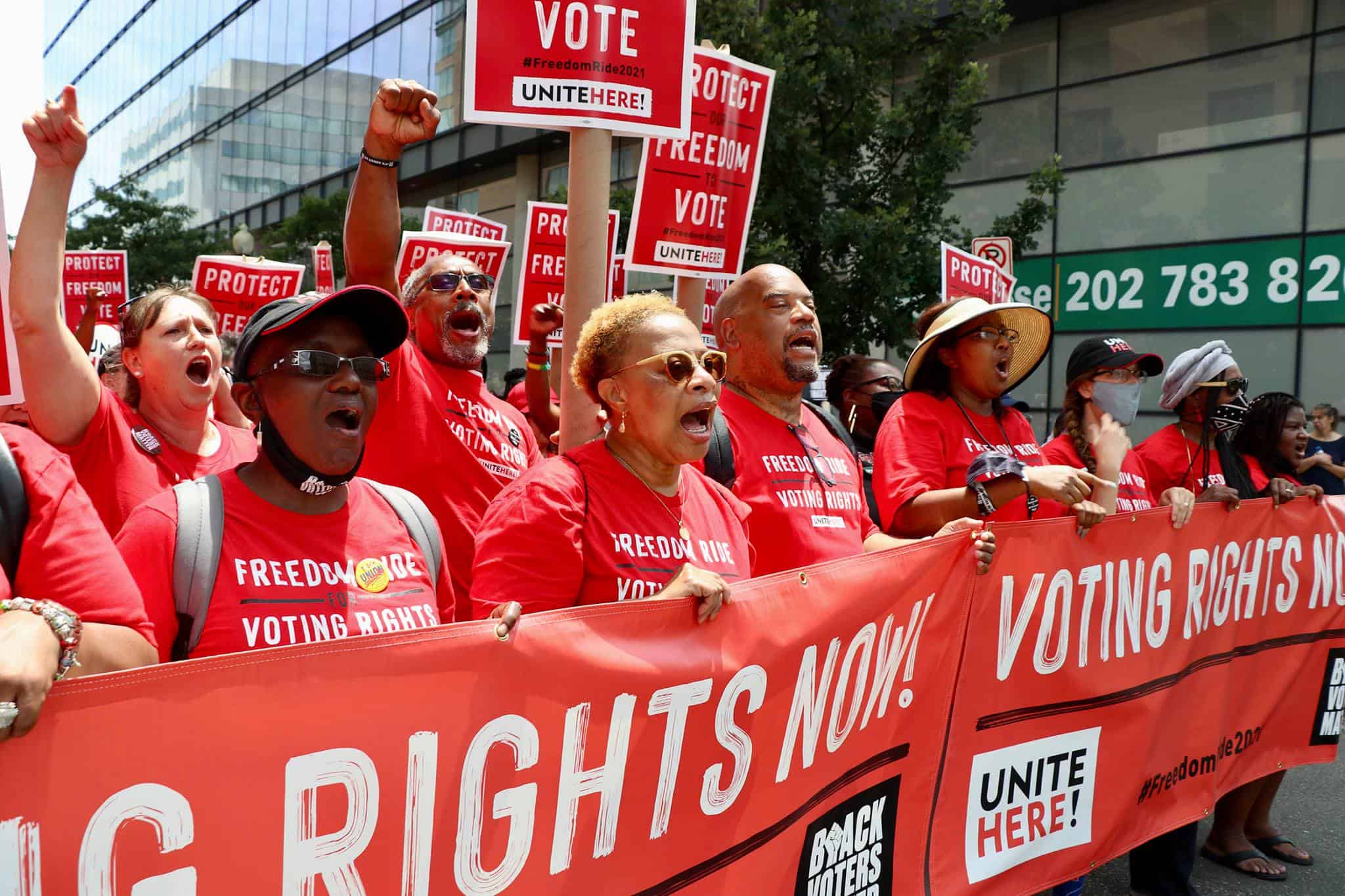
Tascha Shahriari-Parsa is a student at Harvard Law School.
In an awaited decision on Thursday, the Supreme Court ruled 6-3 that a series of Arizona laws restricting voting access—which have a disparate impact on voters of color—did not violate the 1965 Voting Rights Act (VRA). The first of these restrictions nullified any ballots cast at the wrong precinct. 10,979 such ballots were discarded in Arizona in 2012; last year, Biden defeated Trump by only 10,457 votes. Although the majority did not deny that the restriction had a disparate impact on minority voters, it concluded that the impact was not enough to warrant striking down the law, since virtually all reasonable voting rules that further legitimate state interests may have a disparate impact. The second outlawed so-called “ballet harvesting,” where community organizations or other individuals can collect ballots and deliver them to polling places. In her dissent, Justice Kagan argued that this measure had a disparate impact on rural Native American communities lacking ready access to mail service. The majority did not buy that there was enough evidence of a disparate impact, and once again believed that the State’s compelling interests “in preserving the integrity of its election procedures” were strong enough to overcome any disparate impact if it existed. The Court also rejected claims that the Arizona laws were enacted with a discriminatory purpose.
The Court’s decision may contribute to a further narrowing of enforcement of the VRA in lower courts. As numerous states have passed restrictive voting laws in 2021, the decision makes it more likely that these laws will stand without federal legislative reform. One Unite Here Freedom Rider, Marilyn Wilbur, spoke virtually to Senate majority leader Chuck Schumer, saying “I did not risk my life doing multiple tours in Iraq to come back home and have my elected officials dictate my voice at the ballot box.” Wilbur, a food service worker at Arizona State University, helped organize the workers at her university during the pandemic. “I didn’t risk my life for this country just to have an outdated Senate procedure undermine my democratic rights,” she said.
On Wednesday, The NLRB accepted a request from employer Geodis Logistics to review a decision by the Regional Director of the New Orleans Regional Office, M. Kathleen McKinney. In November, McKinney had denied Geodis Logistics’ second request to renew an employee’s petition to decertify her unit from the United Steelworkers (USW). In dissent, McFerran argued that under the NLRA, the board cannot grant a request to renew a decertification petition made by an employer, or anyone other than employees and their representatives. The text of NLRA Section 9(c)(1)(A) states that “an employee or group of employees or any individual or labor organization acting in their behalf” can file a decertification petition. McFerran also submitted that Geodis Logistics had not raised substantial issues warranting review. The majority’s order did not address McFerran’s contentions.
Around 400 employees of the Brooklyn Public Defender’s Office In New York, known as Brooklyn Defender Services (BDS), sought unionization with the Association of Legal Aid Attorneys this week. On Wednesday, the union claimed that a supermajority of workers had signed cards to join the union. The executive director of BDS, Lisa Schreibersdorf, agreed to recognize the union if they have enough cards signed. “If my staff believes they want to be in a union, I think they deserve me to work with them,” she told the NY Daily News. A union organizing effort at BDS did not succeed in 2016.
On Wednesday, an Indiana Judge granted an injunction against a section of an Indiana law that imposed severe limitations on dues authorizations for school employees in collective bargaining agreements. The law stated that any authorization submitted by a school employee before July 1, 2021 will expire on July 1, 2021 and thus must be resubmitted. According to the judge, this “completely abrogates existing authorization agreements” and thus substantially impairs existing contractual relationships, rendering this portion of the law void under the Contract Clause of the U.S. Constitution. The judge also ruled that another part of the law, which required teachers to “acknowledge their understanding that they have a right not to join a union,” unconstitutionally violates teachers’ free speech rights because Indiana failed to offer any real justification for the provision—in particular, Indiana did not supply “any basis for its apparent belief that teachers do not already know these rights.”
On Thursday, The NLRB charged CW Building Maintenance in San Francisco, California, with an Unfair Labor Practice, and ordered the company to cease and desist from failing and refusing to bargain in good faith with SEIU Local 87. The NLRB also ordered the employer to make employees whole for its failure to make pension payments as required by its CBA with Local 87. In March, 700 local 87 janitors walked off the job fighting for workplace safety protections, seniority rights and fair pay.






Daily News & Commentary
Start your day with our roundup of the latest labor developments. See all
July 14
More circuits weigh in on two-step certification; Uber challengers Seattle deactivation ordinance.
July 13
APWU and USPS ratify a new contract, ICE barred from racial profiling in Los Angeles, and the fight continues over the dismantling of NIOSH
July 11
Regional director orders election without Board quorum; 9th Circuit pauses injunction on Executive Order; Driverless car legislation in Massachusetts
July 10
Wisconsin Supreme Court holds UW Health nurses are not covered by Wisconsin’s Labor Peace Act; a district judge denies the request to stay an injunction pending appeal; the NFLPA appeals an arbitration decision.
July 9
the Supreme Court allows Trump to proceed with mass firings; Secretary of Agriculture suggests Medicaid recipients replace deported migrant farmworkers; DHS ends TPS for Nicaragua and Honduras
July 8
In today’s news and commentary, Apple wins at the Fifth Circuit against the NLRB, Florida enacts a noncompete-friendly law, and complications with the No Tax on Tips in the Big Beautiful Bill. Apple won an appeal overturning a National Labor Relations Board (NLRB) decision that the company violated labor law by coercively questioning an employee […]